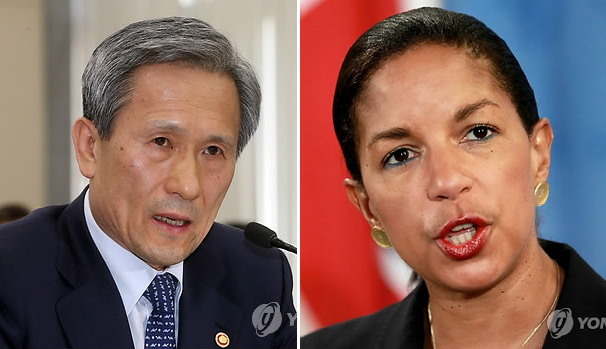The transfer of wartime operational control and missile defense cooperation may top the agenda should the national security chiefs of South Korea and the U.S. meet for their first official bilateral meeting in Washington, observers said Monday.
Cheong Wa Dae said Sunday that Seoul and Washington were seeking to arrange a meeting between South Korea’s presidential National Security Office chief Kim Kwan-jin and U.S. National Security Adviser Susan Rice, and that details were yet to be determined.
Kim and Rice are expected to discuss the delay in the OPCON transfer and Washington’s wish to deploy to the peninsula an advanced missile defense system, called Terminal High-Altitude Area Defense, analysts said.
Cheong Wa Dae said Sunday that Seoul and Washington were seeking to arrange a meeting between South Korea’s presidential National Security Office chief Kim Kwan-jin and U.S. National Security Adviser Susan Rice, and that details were yet to be determined.
Kim and Rice are expected to discuss the delay in the OPCON transfer and Washington’s wish to deploy to the peninsula an advanced missile defense system, called Terminal High-Altitude Area Defense, analysts said.

The meeting is likely to be held later this month before the allies’ defense chiefs meet next month at their annual Security Consultative Meeting, where they are expected to determine the timing of the OPCON transfer, currently scheduled for December 2015. Thus, Kim and Rice may use the meeting to fine-tune their stances on the transfer.
Analysts say that the transfer may be delayed until after the early 2020s, when the South is expected to have completed building its low-tier Korea Air and Missile Defense program and “Kill Chain” preemptive strike system.
Seoul requested a delay in the OPCON transfer last year after Pyongyang conducted a third nuclear test and staged a series of saber-rattling moves including repeated missile and rocket launches. Initially scheduled for April 2012, the transfer was first delayed to 2015 in June 2010 amid Pyongyang’s continuing provocations.
The U.S.’ pursuit of THAAD deployment to the South is also a major pending issue facing the allies.
Washington has been considering placing the core asset of the multilayered U.S. missile defense program on the peninsula to better deal with the North’s increasing missile threats. But Seoul has been concerned that the deployment could hurt its ties with China and Russia, which believe THAAD may potentially target them.
Yonhap said that the U.S. had finished a site survey in South Korea to find out whether it is feasible to deploy the THAAD system here. Citing a source, the news agency said that the U.S. would soon finalize its decision over the THAAD deployment.
The major source of controversy is a land-based radar that is embedded with the THAAD interception system. The AN/TPY-2 radar has a maximum detection range of 1,800 km. Beijing and Moscow think that the radar could be used to glean intelligence about their militaries.
Amid rising concerns over possible diplomatic frictions with China and Russia, Seoul has stressed that it would focus on developing its own low-tier multiple interception missile shield and would not join the global U.S. MD program.
Meanwhile, the White House said Sunday that the U.S. policy toward the North remains unchanged, and reiterated that the communist state should show its denuclearization commitment through action if it wants to resume the multilateral aid-for-denuclearization talks.
“We remain open to dialogue with North Korea but will continue to judge North Korea by its actions, not its words. We are not interested in talks for the sake of talks,” Patrick Ventrell, a spokesman of the National Security Council, told Yonhap.
“U.S. principles in this regard remain the same and unchanged. North Korea must show it is serious and prepared to abide by its commitments, particularly concerning denuclearization, before authentic and credible negotiations are possible.”
The statement came as North Korea’s Foreign Minister Ri Su-young was preparing to travel to the U.S. to attend the meeting of the U.N. General Assembly to begin in mid-September. His visit would mark the visit to U.S. by a North Korean foreign minister in 15 years.
By Song Sang-ho (sshluck@heraldcorp.com)
-
Articles by Korea Herald




![[Herald Interview] 'Amid aging population, Korea to invite more young professionals from overseas'](http://res.heraldm.com/phpwas/restmb_idxmake.php?idx=644&simg=/content/image/2024/04/24/20240424050844_0.jpg&u=20240424200058)












![[KH Explains] Korean shipbuilding stocks rally: Real growth or bubble?](http://res.heraldm.com/phpwas/restmb_idxmake.php?idx=652&simg=/content/image/2024/04/25/20240425050656_0.jpg&u=)

